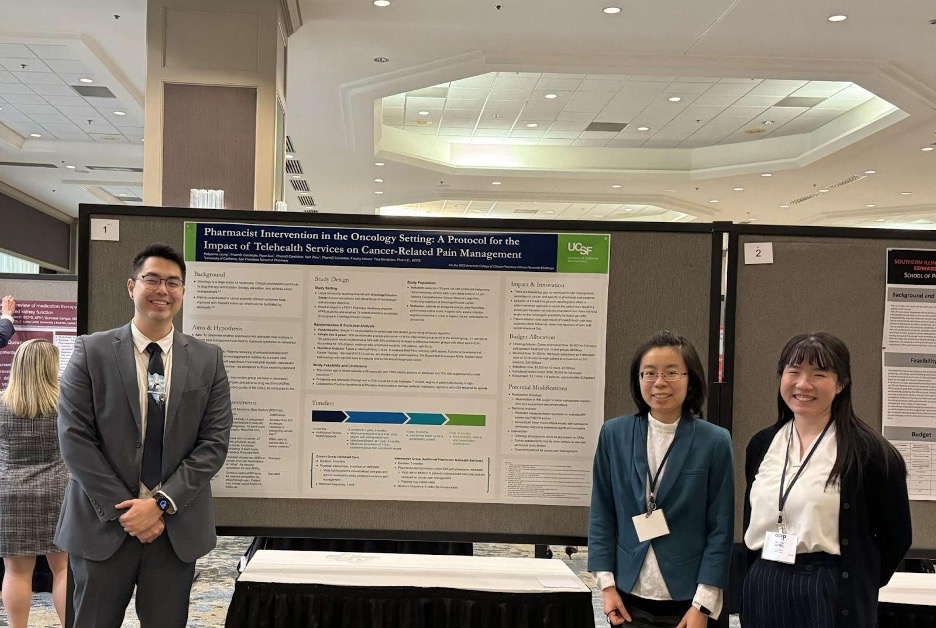 Meet the Winners of the 2023 Clinical Research Challenge
Meet the Winners of the 2023 Clinical Research Challenge
(Left to Right: Ryan Sue, Pollyanna Leung, and April Zhou)
This year, Ryan Sue, Pollyanna Leung, and April Zhou from the University of San Francisco School of Pharmacy earned the title of ACCP’s 2023 Clinical Research Challenge (CRC) champion at the Annual Meeting in Dallas, Texas. Under the guidance of Tina Denetclaw, Pharm.D., their proposal was titled “Pharmacist Intervention in the Oncology Setting: The Impact of Telehealth Services on Cancer-Related Pain Management.” After their victory earlier in the year, the ACCP National Student Network Advisory Committee chair (Kaely Miller) and secretary (Geetha Lingechetty) asked the team a few questions:
Why did you choose pharmacy?
- Ryan: I chose pharmacy because I have always been really interested in complex molecules’ therapeutic effects and hope to advance medicine through a patient-centric approach to drug development. My bachelor’s is in pharmaceutical chemistry and I hope to pursue a career in clinical research, so pharmacy felt like the perfect fit where I’d be able to expand my knowledge of a multitude of disease states and their respective treatment landscapes.
- April: After being involved with research looking at antibiotic resistance, I became interested in infectious diseases. Pharmacy felt like the right intersection where I could both pursue this interest further and be involved more directly with patient care.
- Pollyanna: After seeing patients using high-risk drugs like insulin and anticoagulants, I became interested in the idea of becoming a medication expert on a patient care team. As a pharmacist, I would be able to help both patients and other fellow health care professionals.
How did you choose to work together on this team?
- We tried to stay as organized as possible and constantly communicate so that we could set aside time to work individually and then review the elements of our proposal together for a cohesive deliverable. As we advanced, we coordinated our schedules and set soft deadlines to ensure adequate time to complete our tasks efficiently.
What did you do to prepare?
- With the help of our mentor, Dr. Tina Denetclaw, we organized a couple of practice sessions to strengthen our teamwork and speed for the Journal Club round. We utilized practice questions from the ACCP website and reviewed biostatistics lessons as well. For the LOI round, we brainstormed a ton of topics we felt could apply to the prompt and discussed what we thought would give us an edge in innovation with our study, searching for unmet needs in the oncology space where pharmacists could utilize their medication specialization. We compiled as many relevant resources as we could for our topic and reviewed the literature together to develop our overall plan.
What tips or tricks do you have for future competitors?
- The approach that worked for us was to try and find relevant and emerging topics in health care to apply to the therapeutic area given and assess unique areas of improvement within the treatment space. Telehealth has gained a surge of popularity since the COVID-19 pandemic and has helped alleviate a lot of patient burden, so we wanted to tie this into our proposal and focus on an aspect of care within the oncology setting where a pharmacist could fully utilize their strengths.
What did each of you bring to the team that was unique?
- Ryan: In my managed care internships, I reviewed primary literature to compose formulary recommendations for pharmacy and therapeutics committees. This helped me to better evaluate biases and the validity of clinical research and hypothesize how to eliminate any bias in our trial design.
- April: Through my undergraduate and into the pharmacy program, I’ve been involved with research and data analysis. This equipped me well in understanding study design and interpreting analytical results and chosen methods.
- Pollyanna: I tried to put myself in a patient’s shoes when brainstorming what topics we should address for our research proposal that also met the requirements of the prompt.
In hindsight, is there anything you would have done differently to prepare?
- In hindsight, we could have practiced our efficiency a bit more before the Journal Club round. The time flies by and there are lots of questions to get through, so while we were very proud of ourselves for advancing, we could have practiced our speed to ensure we could finish with a strong pace in round 1. We could also have been more detail oriented as we built our proposal.
What motivated you to compete in the CRC? What motivations did you have throughout your preparation?
- We were motivated to compete in the CRC to strengthen our knowledge of clinical research and trial design. Overall, we participated to gain meaningful experience we could apply to our postgraduate plans and explore opportunities in clinical research.
Who was your most influential mentor?
- Our most influential mentor was Dr. Tina Denetclaw, who helped organize the local competition, practice for the Journal Club round, and submit our deliverables throughout the challenge. A huge thanks to Dr. Denetclaw for all of her help and hard work!
Interviewees: Pollyanna Leung, Ryan Sue, and April Zhou
Interviewers: Kaely Miller (SNAC chair) and Geetha Lingechetty (SNAC secretary)
Congratulations to the winners of the 2023 Clinical Research Challenge!